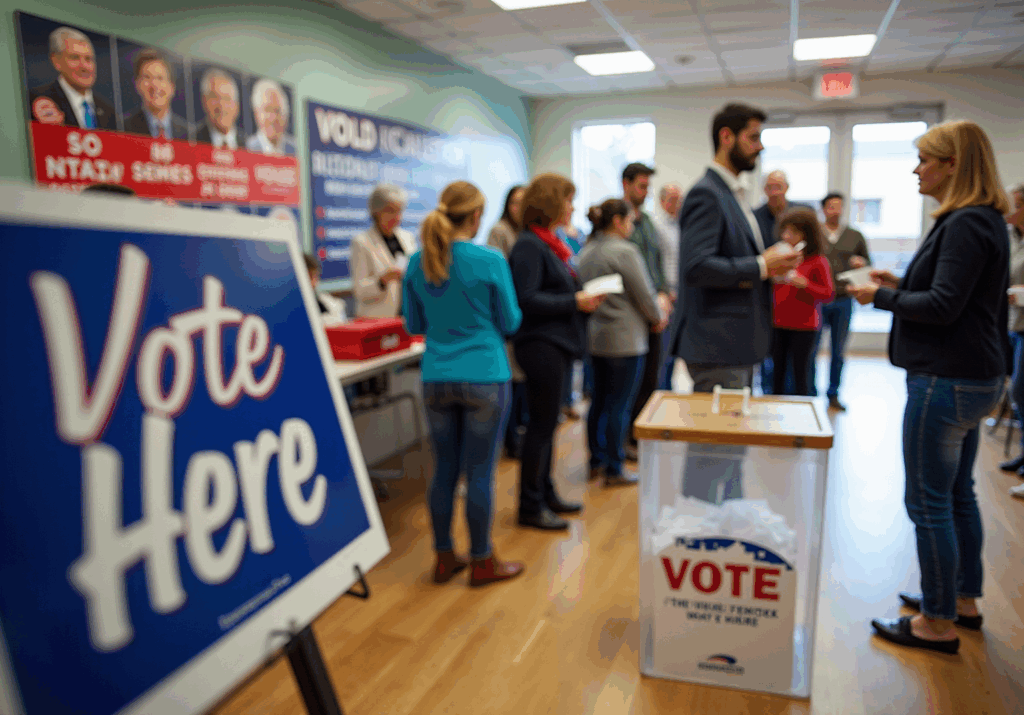Overview
Runoff elections are a pivotal mechanism for determining a winner when no candidate secures a majority in the initial voting round, ensuring that the selected individual commands more than 50% of the votes. Their significance in preserving democratic integrity and representation cannot be overstated.
For instance, the mandatory runoff in Georgia exemplifies how these elections reinforce the principle of majority rule. This process allows voters to clarify their preferences, ultimately enhancing the legitimacy of the electoral outcome.
Understanding the role of runoff elections is essential for appreciating their contribution to a robust democratic framework.
Introduction
Understanding runoff elections is essential for grasping how democratic systems ensure that elected officials truly represent the will of the people. These secondary voting processes emerge when no candidate secures a majority in the initial round, providing a crucial opportunity for voters to clarify their preferences.
However, voter turnout often diminishes significantly in these contests, raising important questions about their effectiveness and the integrity of electoral outcomes.
What implications do runoff elections hold for democracy? How can they be improved to foster greater participation and representation? Addressing these questions is vital for enhancing democratic engagement and ensuring that every voice is heard.
Define Runoff Elections: Meaning and Importance
The runoff election meaning serves as a vital mechanism for determining a winner when no candidate secures the necessary majority in the initial voting round. This secondary voting process is essential for ensuring that the selected individual has received over 50% of the votes, thereby enhancing the legitimacy of the outcome.
Runoff election meaning is crucial in preserving democratic integrity, as they allow the electorate to clarify their preferences, particularly in contests featuring multiple candidates. For instance, in Georgia, a runoff is mandated when no candidate achieves a majority, as illustrated in the recent election between Mr. Warnock and Mr. Walker, where neither candidate reached the required threshold.
This system not only but also explains the runoff election meaning by addressing concerns related to representation and participation. Furthermore, runoff votes are frequently utilized in various electoral contexts, including primaries and general elections across numerous states, ensuring that the democratic process remains robust and reflective of the electorate’s choices.
Experts note that while runoff elections may lead to decreased voter turnout compared to general elections, they are crucial for maintaining the integrity of the electoral system and ensuring that elected officials genuinely represent the majority of voters.
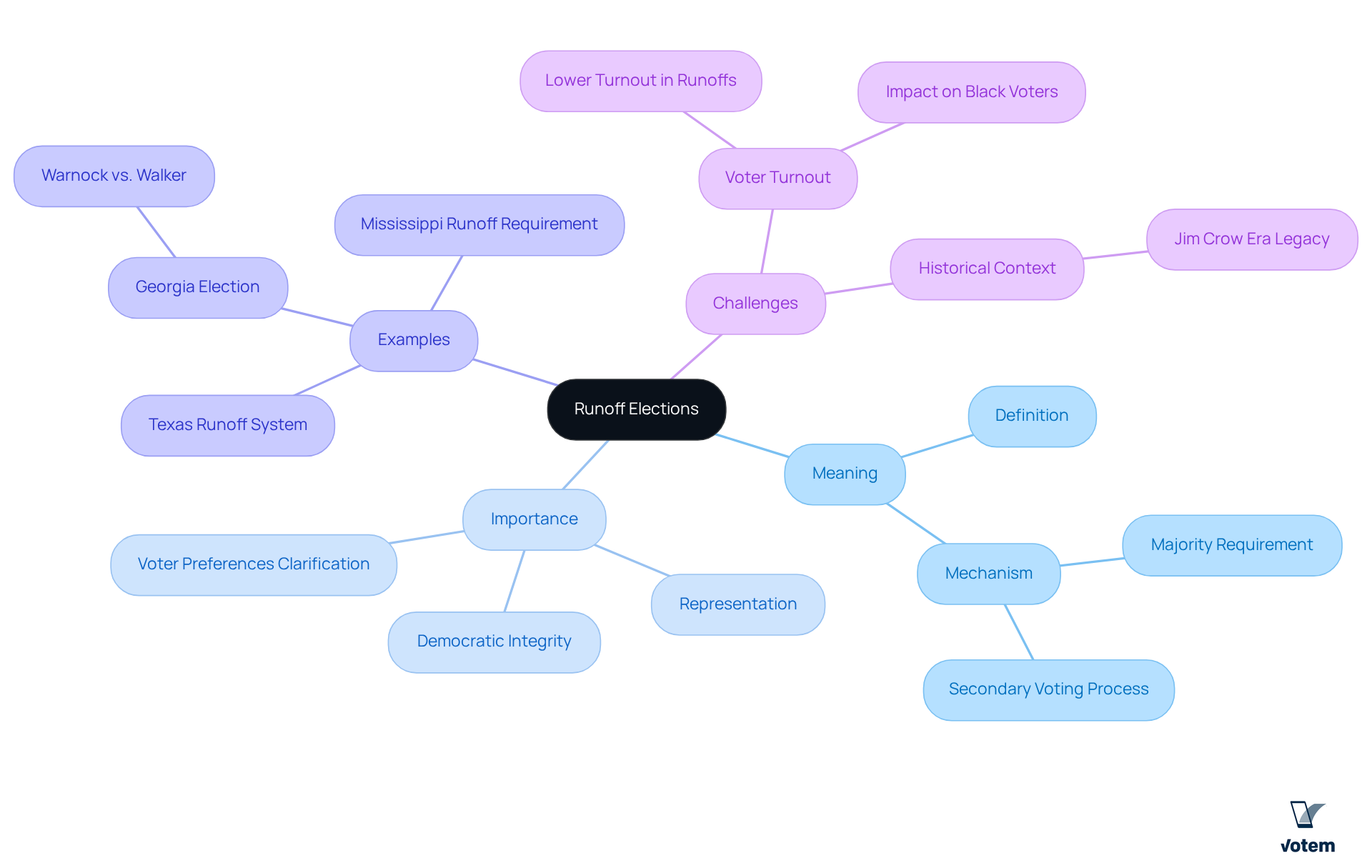
Trace the History and Evolution of Runoff Elections
The runoff election meaning reflects a multifaceted history that dates back to the early 20th century, primarily introduced in Southern states to ensure majority rule in voting. Initially, these votes sought to address legitimacy issues amid a politically fragmented landscape. The county unit system, which allocated greater electoral influence to rural counties, significantly shaped the election process, often marginalizing urban minority communities. Over the decades, the adoption of second-round elections has expanded, with ten states currently employing them in primary elections, while Georgia uniquely holds them for general elections. This evolution reflects ongoing discussions about citizen representation and the runoff election meaning in the context of the effectiveness of various electoral systems in achieving democratic objectives.
The election system in Georgia, established in 1963, was influenced by historical contexts of racial polarization and voter suppression, particularly aimed at consolidating white political power. Denmark Groover, a segregationist legislator, proposed the secondary election system to disrupt what he termed the ‘Negro Voting Block,’ underscoring the racial dynamics at play. As states continue to navigate the balance between securing majority support and fostering inclusive representation, the runoff election meaning remains a crucial topic in the discourse on electoral integrity and fairness.
Alternatives such as ranked choice voting are also under consideration as potential solutions to enhance voter representation. This ongoing dialogue invites reflection on how to better serve diverse populations, ensuring that all voices are heard and represented in the democratic process.
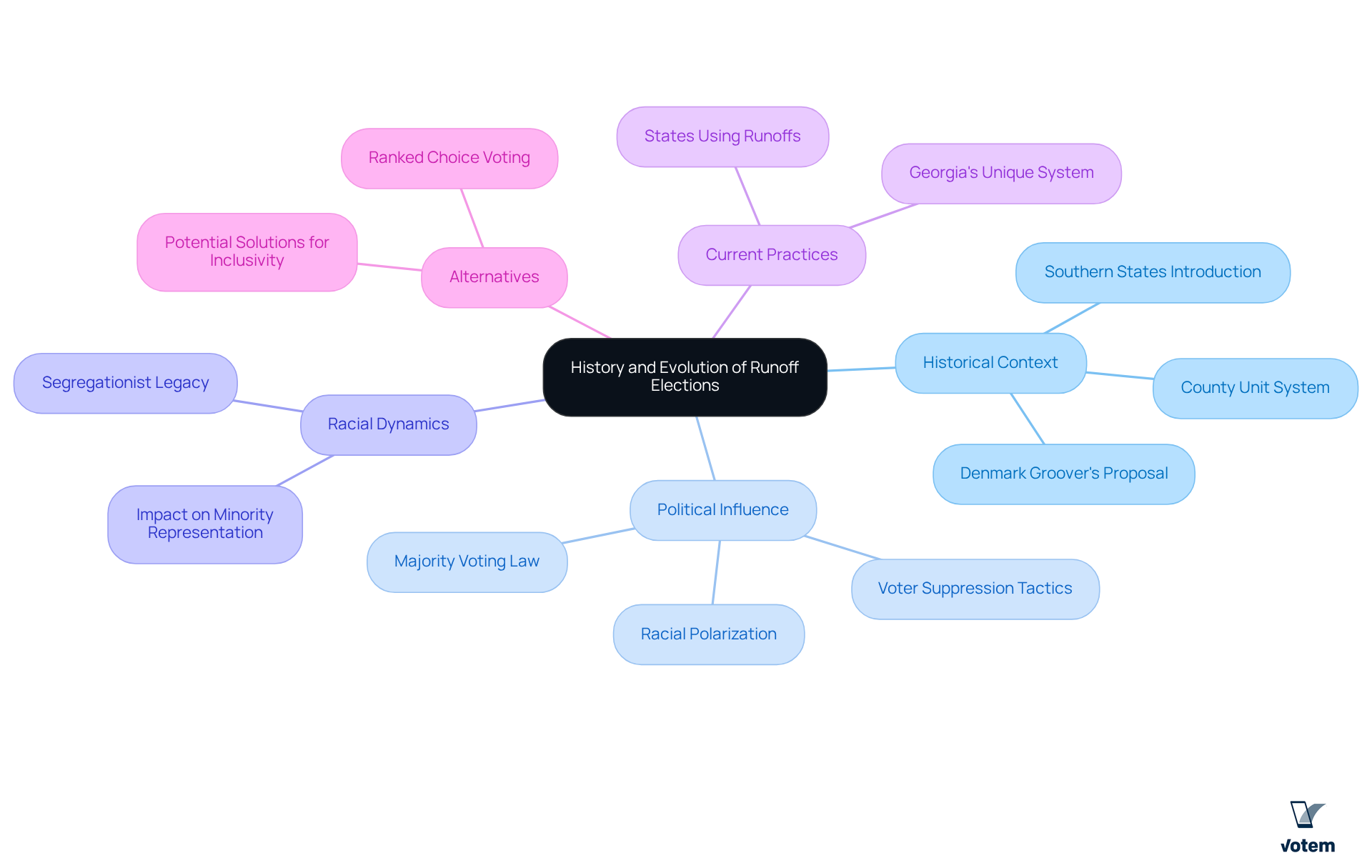
Examine Key Characteristics and Mechanisms of Runoff Elections
Essential features of subsequent voting rounds require an individual to secure a majority of votes for success, typically defined as exceeding 50% of the total votes cast. Voting mechanisms can vary by state; some states adopt a traditional , reflecting the runoff election meaning, where the top two candidates from the initial vote face off in a subsequent election. Conversely, others may implement instant elimination voting (IRV), allowing participants to rank candidates, leading to the removal of the lowest-ranked candidates until one candidate achieves a majority. These mechanisms are designed to ensure that the ultimate winner enjoys widespread support among the electorate, thereby strengthening the democratic process.
Votem’s versatile online voting platform accommodates these diverse polling types and voting methods, guaranteeing that processes remain accessible, secure, transparent, and auditable. By leveraging advanced online polling solutions, Votem enhances participation and confidence, which is particularly crucial in understanding the runoff election meaning during second-round contests. This adaptability not only meets the needs of union leadership but also fosters a more engaged electorate, ultimately contributing to a more robust democratic framework.
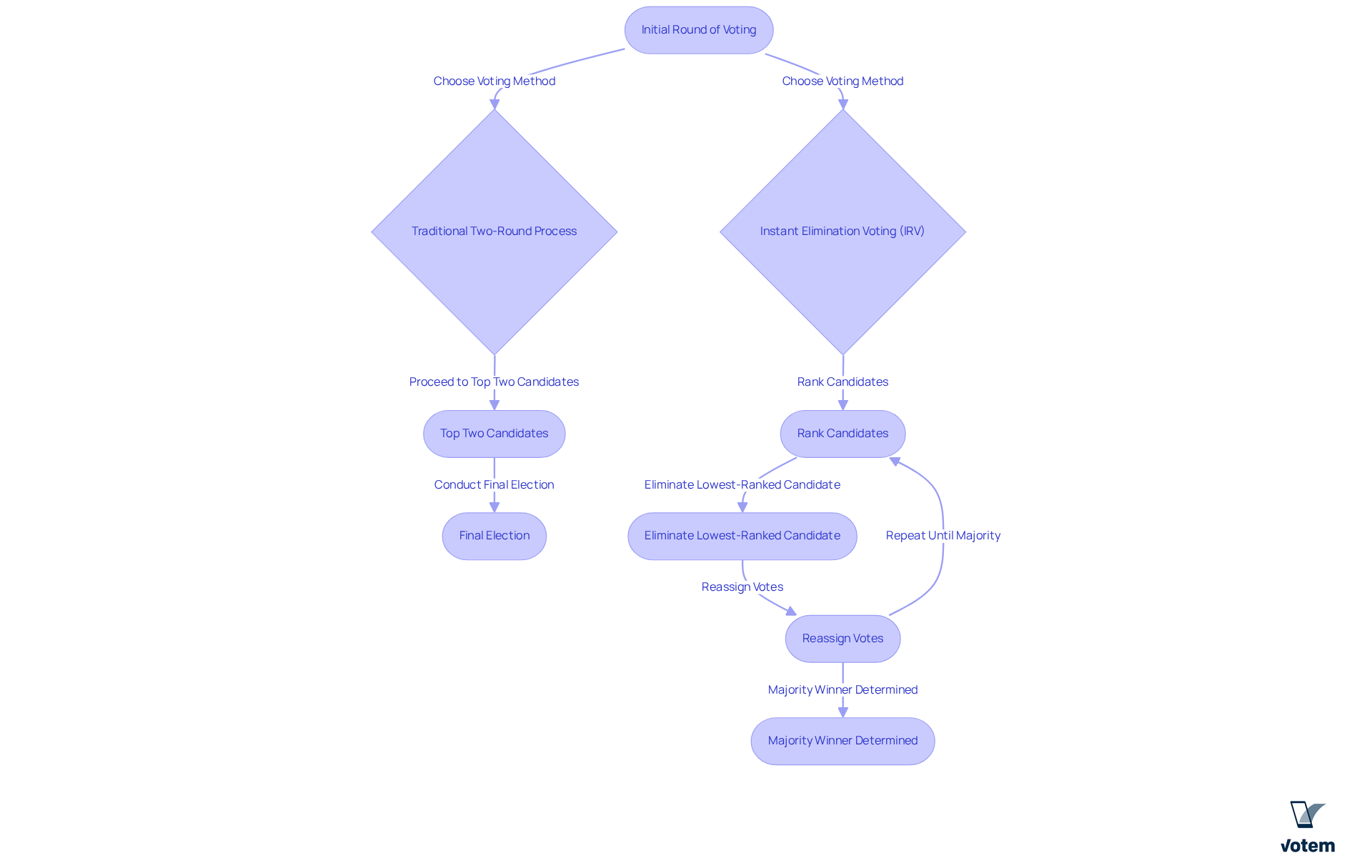
Analyze the Impact of Runoff Elections on Voter Turnout and Outcomes
Runoff contests often lead to a notable decline in voter turnout, with research indicating that participation can plummet by as much as 63% compared to initial polls. This trend raises critical concerns about the representativeness of electoral outcomes. Key factors contributing to this decline include voter fatigue, a lack of awareness regarding the secondary voting process, and the perception that the initial results were conclusive. For instance, in Georgia, recent second-round votes have witnessed a 10% reduction in participation, a slight decline compared to past decreases that have reached as high as 92% in previous cycles.
Despite these challenges, subsequent votes present an opportunity for more informed decision-making. Candidates often engage in deeper discussions about their policies and platforms, enabling the electorate to make better-informed choices. Votem‘s have played a crucial role in addressing these challenges. As Linda McCulloch noted, the implementation of Votem’s system has broadened access for all eligible voters, including military personnel and individuals with disabilities, which is vital for enhancing involvement in subsequent voting. However, the effectiveness of secondary voting in fostering democratic engagement remains a topic of debate among political analysts and electoral reform advocates. Experts such as Deb Otis from FairVote emphasize that secondary voting procedures can incur higher costs and lead to decreased participation, as evidenced by the statistic that 81% of candidates who succeeded in these contests received fewer votes than in the initial round.
The financial implications are also significant; special contests can be costly for taxpayers, with estimates suggesting that Georgia’s recent contests could amount to up to $100 per vote. This raises pertinent questions about the sustainability of such electoral processes and the necessity for reforms, such as ranked choice voting (RCV), which could streamline ballots and potentially boost participation. RCV allows voters to rank candidates in order of preference, eliminating the need for a subsequent vote and reducing the expenses associated with additional campaigns, as observed in cities like New York and Minneapolis. Ultimately, the ongoing discourse surrounding runoff election meaning highlights the importance of exploring alternative voting systems to enhance participation and representation in the electoral process.
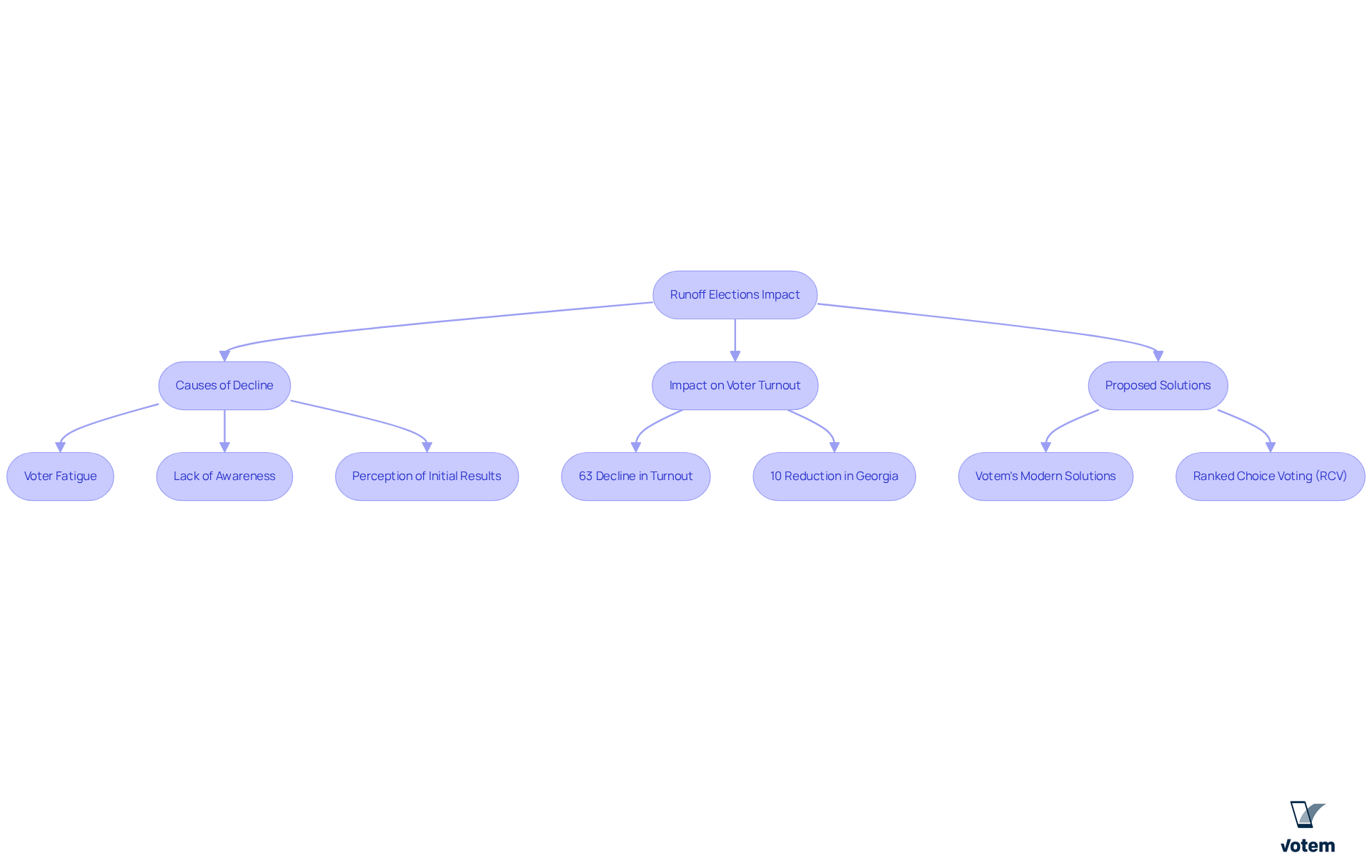
Conclusion
The significance of runoff elections cannot be overstated; they are essential in ensuring that elected officials truly represent the will of the majority. By necessitating a second round of voting when no candidate secures the required majority, runoff elections enhance the legitimacy of electoral outcomes and reinforce democratic principles. This process clarifies voter preferences and upholds the integrity of the electoral system, allowing for a more accurate reflection of the electorate’s choices.
Throughout this article, we have explored key points, including:
- The historical evolution of runoff elections
- Their mechanisms
- Their impact on voter turnout
The discussion has highlighted the origins of runoff elections in the early 20th century, particularly in the Southern states, and how they have adapted over time. Furthermore, we examined the various voting methods employed in runoff elections, such as traditional two-round processes and instant elimination voting, while also addressing the challenges posed by decreased voter participation and the financial implications of these contests.
Ultimately, the ongoing dialogue surrounding runoff elections invites broader reflection on the need for electoral reforms that promote inclusivity and representation. As alternatives like ranked choice voting gain traction, it becomes increasingly important to consider how these changes could enhance voter engagement and ensure that every voice is heard in the democratic process. Embracing innovative electoral systems can pave the way for a more representative and participatory democracy, reinforcing the fundamental values that underpin our electoral processes.
Frequently Asked Questions
What is the meaning of runoff elections?
Runoff elections are a secondary voting process used to determine a winner when no candidate secures the necessary majority (over 50%) in the initial voting round.
Why are runoff elections important?
Runoff elections are important because they enhance the legitimacy of the outcome by ensuring that the selected individual has received a majority of the votes, thereby preserving democratic integrity.
How do runoff elections affect voter preferences?
Runoff elections allow the electorate to clarify their preferences, especially in contests with multiple candidates, ensuring that the final choice reflects the majority’s will.
Can you provide an example of a runoff election?
An example of a runoff election is the recent contest in Georgia between Mr. Warnock and Mr. Walker, where a runoff was necessary because neither candidate achieved the required majority.
In what contexts are runoff elections commonly used?
Runoff elections are frequently utilized in various electoral contexts, including primaries and general elections across many states.
What impact do runoff elections have on voter turnout?
Experts note that runoff elections may lead to decreased voter turnout compared to general elections, but they are essential for maintaining the integrity of the electoral system.
How do runoff elections contribute to representation?
Runoff elections address concerns related to representation and participation by ensuring that elected officials genuinely represent the majority of voters.
List of Sources
- Define Runoff Elections: Meaning and Importance
- Runoff election (https://ballotpedia.org/Runoff_election)
- What triggers a runoff election in Texas? Here’s what you need to know (https://keranews.org/texas-news/2024-02-27/how-many-primary-races-will-require-overtime-heres-what-you-need-to-know-about-runoffs-in-texas)
- Understanding Runoff Elections in Georgia, and How to Ensure Your Vote Counts (https://atlanta.capitalbnews.org/runoff-midterms-warnock-walker)
- How Georgia’s Senate Runoff Will Work (Published 2022) (https://nytimes.com/2022/11/10/us/elections/georgia-senate-runoff.html)
- Running a low-turnout Georgia runoff election could cost $100 per vote (https://apnews.com/article/georgia-runoff-election-ranked-choice-voting-c7fa07e40ff418d74176734ab850f3ff)
- Trace the History and Evolution of Runoff Elections
- The Racist Roots of Primary Runoffs in the South (https://democracydocket.com/analysis/the-racist-roots-of-runoffs-in-the-south)
- Georgia’s Runoff Elections Have a Racist History (https://time.com/6232641/georgia-runoffs-racist-history-warnock-walker)
- Georgia’s runoff elections have segregationist roots (https://pbs.org/newshour/politics/the-racist-history-behind-georgias-runoff-elections)
- The racist history behind Georgia’s runoff elections (https://gpb.org/news/2022/12/03/the-racist-history-behind-georgias-runoff-elections)
- Examine Key Characteristics and Mechanisms of Runoff Elections
- An Explainer: Runoff Elections (https://rockthevote.org/explainers/runoff-elections-an-explainer)
- Low Turnout and High Cost in primary runoffs, 1994-2024 – FairVote (https://fairvote.org/report/low-turnout-and-high-cost-in-primary-runoffs-1994-2024)
- What triggers a runoff election in Texas? Here’s what you need to know (https://keranews.org/texas-news/2024-02-27/how-many-primary-races-will-require-overtime-heres-what-you-need-to-know-about-runoffs-in-texas)
- How do runoff elections work? | USAFacts (https://usafacts.org/articles/how-do-runoff-elections-work)
- The Impact of Instant Runoff Voting on Representation for Women and People of Color | Unite America (https://uniteamerica.org/articles/the-impact-of-instant-runoff-voting-on-representation-for-women-and-people-of-color)
- Analyze the Impact of Runoff Elections on Voter Turnout and Outcomes
- Runoffs See 63% Decline in Voter Turnout, Report Finds – FairVote (https://fairvote.org/press/runoffs-see-63-decline-in-voter-turnout-report-finds)
- Record Breaking Turnout in Georgia’s Runoff Election | Georgia Secretary of State (https://sos.ga.gov/news/record-breaking-turnout-georgias-runoff-election)
- Georgia PSC Race Heads to Runoff With Low Turnout (https://atlanta.capitalbnews.org/georgia-psc-runoff)
- Georgia runoff sees turnout drop 10%. Ranked choice voting can help. – FairVote (https://fairvote.org/georgia-runoff-sees-turnout-drop-10-ranked-choice-voting-can-help)

